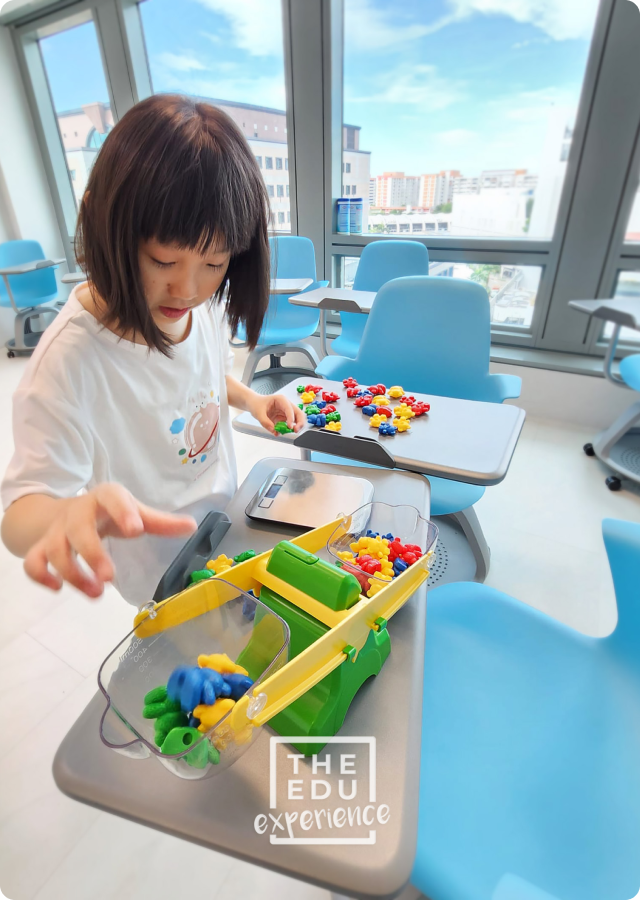
Primary School Math Tuition
Master Primary School Math with Our ACE Approach

Primary 1-2 Math:
Accelerate Arithmetic
Our Mathematics curriculum for lower primary centres around helping our young learners develop a keen interest in Mathematics and improving their ability to understand the essentials of arithmetic.
Arithmetic is the fundamentals and most important branch of Mathematics, which includes the operations of numbers. These operations are Addition, Subtraction, Multiplication, and Division. Students need to understand the rules of numbers and how they work. They need to understand the operations of number bonds so that they can add and subtract more accurately and quickly. This process takes time but with exposure and practice, young learners will be able to work on them more effectively and efficiently.
Students learn through:
- Lesson materials that relate mathematical concepts to real life and help students develop logical reasoning skills
- Interactive activities which make learning fun and allow students to apply concepts taught
- Challenging questions that strengthen problem-solving skills and develop critical thinking
- Weekly quizzes which monitor their learning progress
- Help students to adapt to math concepts in Primary school
Prepare Your Child for Primary School Math
Primary 1 can be stressful as children are transiting from Kindergarten to Primary School, which equates to tougher concepts taught in class and a gradually heavier workload. Therefore, it is never too early to start tuition as our curriculum uses fun and engaging methods to help them develop an interest in math and learn leisurely for a start.
As students grow older, the mathematical concepts get more complex and the math problems to solve get tougher. Therefore, Primary 1 and Primary 2 are important educational blocks to laying a strong foundation and being confident with the core mathematical concepts. Our math tuition curriculum can help them grasp and comprehend these concepts, which will benefit them greatly as they progress.
Primary 3-4 Math:
Conquer Challenges
Through thought-provoking questions, we hone students’ critical thinking and analytical skills. Supported by the foundational knowledge from lower Primary math, students are able to conquer increasingly complex math problems.
Students learn through:
- Engaging and fun-filled workshops that nurture their love for learning and relate math to their daily lives
- Heuristics and progressive problem-solving strategies to overcome various problem sums
- Targeted lessons and weekly quizzes to identify and address learning gaps
- Constant practice so students gain confidence and perform well in exams

Cope with Increasingly Complex Math Problems with our Math Tuition Curriculum
At The Edu Experience, we introduce Mathematical heuristics to students when they reach Primary 3 and Primary 4, to facilitate problem solving techniques and strategies to analyse complex word problems.
At this stage, the difficulty of students’ schoolwork increases continuously, and they might not fully grasp the concepts during classes in school. Our math tuition program comes into place as students get to clarify their doubts they have from school and from there, target and work on their weaknesses. To fully comprehend these math concepts and skills, students get to practice consistently through worksheets and activities, helping them achieve better results in school and boost confidence in the subject.
As students’ progress to Primary 5 and start preparing for PSLE math, it is important to have built a strong foundation at this level, so that they can solve problems efficiently, and are familiar with heuristic strategies and processes. Which is why math tuition is important at this level, as we often find students with weaker foundations in P3 & P4 struggling to catch up in P5 & P6.

Primary 3-4 Math:
Conquer Challenges
Through thought-provoking questions, we hone students’ critical thinking and analytical skills. Supported by the foundational knowledge from lower Primary math, students are able to conquer increasingly complex math problems.
Students learn through:
- Engaging and fun-filled workshops that nurture their love for learning and relate math to their daily lives
- Heuristics and progressive problem-solving strategies to overcome various problem sums
- Targeted lessons and weekly quizzes to identify and address learning gaps
- Constant practice so students gain confidence and perform well in exams
Cope with Increasingly Complex Math Problems with our Math Tuition Curriculum
At The Edu Experience, we introduce Mathematical heuristics to students when they reach Primary 3 and Primary 4, to facilitate problem solving techniques and strategies to analyse complex word problems.
At this stage, the difficulty of students’ schoolwork increases continuously, and they might not fully grasp the concepts during classes in school. Our math tuition program comes into place as students get to clarify their doubts they have from school and from there, target and work on their weaknesses. To fully comprehend these math concepts and skills, students get to practice consistently through worksheets and activities, helping them achieve better results in school and boost confidence in the subject.
As students’ progress to Primary 5 and start preparing for PSLE math, it is important to have built a strong foundation at this level, so that they can solve problems efficiently, and are familiar with heuristic strategies and processes. Which is why math tuition is important at this level, as we often find students with weaker foundations in P3 & P4 struggling to catch up in P5 & P6.

Primary 5-6 Math:
Excel in Examinations
We cover diverse question types and empower students with our easy-to-recall, step-by-step EDU method. We provide high quality and challenging practices to fully equip students with diverse math problems, so that they are prepared for the PSLE math exam.
Students learn through:
- PSLE-format practices that simulate exam conditions to hone time-management and accuracy
- Exam-specific strategies and answering techniques that target specific question types
- Exam-specific knowledge like paper format changes
- Curriculum & Holiday workshops that cover a broad range of heuristics to equip them with skills to tackle typical and atypical exam questions
- Reinforce concepts learnt throughout the years and consolidate the knowledge to prepare for PSLE
- Familiarising themselves with heuristic strategies & processes
- Weekly quizzes to monitor their learning progress
Our P5 & P6 PSLE Math Tuition Curriculum
Primary 5 is a critical year with the sudden increase in difficulty from Primary 4 to Primary 5 math, resulting in many students struggling to cope with the advanced topics and concepts taught in school. As the syllabus taught in Primary 5 prepares students for PSLE math papers, it is crucial for students to have a strong understanding of the concepts being taught and be exposed to the PSLE exam format. At The Edu Experience, our math tuition program provides students with stimulated exam conditions where they can get used to the stress to manage their time well.
Needless to say, Primary 6 is the most important year for students as they face the challenge of the PSLE exams that will determine their education route in Secondary school. Our PSLE math tuition curriculum will help students consolidate knowledge from the past 5 years. Grasping the heuristics concepts and having the ability to solve the complex math problems given to them requires good analysis skills and the correct application of methods to each question. Students should be confident in using different heuristics and/or combinations of heuristics, as Singapore math focuses on problem solving. Our curriculum will provide students with these skills and capabilities by offering unlimited tuition hours for students who needs more help and keeping track of their improvement through assessments and tests.








